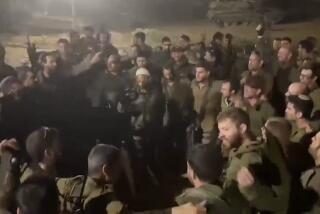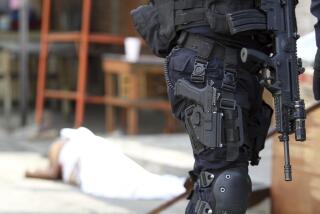U.S. Fears Fallout Over Reported Abuse of Bodies
- Share via
WASHINGTON — The Bush administration moved swiftly Thursday to curb international outrage over a report that U.S. troops in Afghanistan desecrated the bodies of Taliban fighters, setting them ablaze to taunt militants.
U.S. embassies around the world have been given “instructions to engage” their host governments to head off anger provoked by a videotape showing Americans torching the remains of two militants, and Assistant Secretary of State Karen P. Hughes will address the issue during a trip to Muslim areas of South Asia, a State Department official said.
“What we see in this tape is not at all reflective of the values of the military or of the United States,” department spokesman Sean McCormack said.
The diplomatic reaction accompanied a series of harsh denunciations by the Pentagon, which has ordered the Army Criminal Investigation Command to launch an inquiry into the soldiers’ actions. Based on the videotape, the troops appear to be part of a unit that specializes in psychological warfare.
“The incident, if true, is repugnant, and we look forward to getting to the bottom of it,” said Maj. Matthew McLaughlin, a spokesman for the U.S. Central Command in Florida, which oversees military activities in Afghanistan. He said the Army probe would include the incident itself and any connection it may have to psychological operations.
The unusual U.S. response comes in the midst of an administration campaign to counter negative perceptions of Americans among Muslims. The latest incident in Afghanistan could rekindle outrage over the abuse of prisoners in Iraq and allegations that U.S. troops desecrated copies of the Koran belonging to detainees at the Guantanamo Bay lockup in Cuba.
Nihad Awad, executive director of the Council on American-Islamic Relations, said the video would harm America’s image abroad and serve as “recruiting tools for terror groups.” Without a thorough review, he warned, the U.S.-declared war on terrorism would be viewed even more strongly in the Muslim world as a “war on Islam.”
Awad quoted a hadith, or saying of the prophet Muhammad: “Do not abuse the dead, for they have reached the result of what they have done.”
Awad said bodies must be buried quickly, after they first are washed and wrapped in a clean cloth -- none of which apparently took place in the incident.
The tape, made this month by Australian photojournalist Stephen Dupont as he accompanied American troops, aired Wednesday on Australia’s SBS television network.
According to the report, the bodies were set afire in the hills above the village of Gonbaz, north of Kandahar, after the two Taliban fighters were killed by U.S. soldiers the night before. Five troops stood around the fire, and two of them read messages through loudspeakers, trying to provoke other Taliban guerrillas.
The U.S. soldiers, one of them identified as a psychological operations, or “psy-ops,” specialist named Sgt. Jim Baker, dared the Taliban to “come and fight like men.”
In their defense, the U.S. soldiers reportedly said they had burned the bodies for hygienic reasons.
The incident was condemned by Afghan President Hamid Karzai, who ordered an investigation, according to Associated Press.
Separately, the Human Rights First organization, which investigates allegations of military abuse, released a report saying 27 detainees had been killed in U.S. custody since 2002. Seven of the prisoners, the group said, “were tortured to death.”
The report says that Abu Malik Kenami, a 43-year-old Iraqi, died in December 2003 after being forced to do repeated “up and down” standing-and-sitting exercises. He also was handcuffed behind his back, and a sandbag was draped over his head. The next morning, he was found dead in a crowded cell in Mosul, Iraq.
The group identified another slain detainee as Obeed Hethere Radad, who was shot to death Sept. 11, 2003, in his cell in Tikrit, Iraq. The group said his death was not reported for four days, that neither the bullet nor the gun involved was recovered and that no autopsy was conducted.
U.S. military officials declined to discuss individual incidents but have insisted that allegations of detainee abuse are thoroughly investigated and that hundreds of troops have been held accountable.
More to Read
Sign up for Essential California
The most important California stories and recommendations in your inbox every morning.
You may occasionally receive promotional content from the Los Angeles Times.














